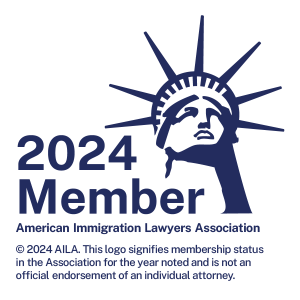RESIDENT – Family/Marriage Based
Immediate Relatives (Spouse, Parent & Child under age 21) of U.S. Citizen
Immediate relatives have special immigration priority and do not have to wait in line for a visa number – visas are available immediately.
If your immediate relative is lawfully in the United States, he/she can apply for adjustment of status to become a permanent resident. The immediate relative is eligible to receive employment authorization while the adjustment of status petition is pending. Processing time is approximately 3-6 months.
If your immediate relative is currently outside the United States, then they can become a permanent resident through consular processing. Consular processing is when U.S. Citizenship & immigration Services works with the Department of State to issue a visa on an approved Form I-130 petition when a visa is available. You may then travel on the visa and will officially become a permanent resident when admitted at a U.S. port of entry.
Preference Category
Immigrant visa numbers for individuals in a “preference category” are limited, so are not always available. Because the demand is higher than the supply of visas for a given year for some categories, a visa queue (waiting list) forms. To distribute the visas among all preference categories, the Department of State gives out the visas by providing visa numbers according to the preference category and one’s priority date. For family sponsored immigration, the priority date is the date that the petition is properly filed with U.S. Citizenship and Immigration Services (USCIS).
The family-sponsored preferences are:
- unmarried sons and daughters of U.S. citizens;
- spouses, children, and unmarried sons and daughters of permanent resident aliens;
- married sons and daughters of U.S. citizens;
- brothers and sisters of U.S. citizens.
For current visa availability, please CLICK HERE view current visa bulletin.
Conditional Permanent Resident
Your permanent residence status is conditional if it is based on a marriage that was less than 2 years old on the day you were given permanent residence. You are given conditional resident status on the day you are lawfully admitted to the United States on an immigrant visa or adjustment of your status to permanent residence.
If your status is conditional, you must remove these conditions and prove you did not get married to evade the immigration laws of the United States at least 90 days before your conditional status (green card) expires.
Child Status Protection Act
In certain cases, the Child Status Protection Act (CSPA) may allow you to retain the classification of “child” even if you have reached age 21. Generally, your age is “frozen” as of the date your U.S. citizen parent files Form I-130 for you.
RESIDENT – Humanitarian Benefits & Victims of Crime
U Visa
The U nonimmigrant status (also known as the U visa) is set aside for victims of crimes who have suffered substantial mental or physical abuse as a result of the crime and who are willing to assist law enforcement and government officials in the investigation or prosecution of the criminal activity. Those who have been granted U nonimmigrant status may file for a green card (permanent residence) after meeting certain requirements.
T Visa
T Nonimmigrant Status (T Visa) is set aside for those who are or have been victims of human trafficking and are willing to assist law enforcement in the investigation or prosecution of acts of trafficking. The T nonimmigrant visa is valid for 3 years and a visa holder may be eligible to apply for permanent residence (Green Card) after 3 years in T nonimmigrant status.
Battered Spouse
As a battered spouse, child or parent, you may file a self-petition for an immigrant visa petition. If you are a self-petitioning spouse or child and you meet all filing requirements, you will receive a notice (Prima Facie Determination Notice) valid for 150 days that you can present to government agencies that provide certain public benefits to certain victims of domestic violence. If you are approved, you may be eligible to file for a green card.
Reinstatement due to death of Petitioner
Humanitarian reinstatement may only be requested by the principal beneficiary when the petitioner of an approved Form I-130, Petition for Alien Relative, has died. Humanitarian reinstatement cannot be granted if the petitioner died while the petition was pending. Humanitarian reinstatement is a discretionary benefit. Exercising discretion means weighing positive factors against negative factors to make a decision. In addition to meeting the basic requirements for humanitarian reinstatement, your request must warrant a favorable exercise of discretion, meaning that the “pros” in granting your request outweigh the “cons.”
Parole in Place – Illegal Family Members of Military Personnel
The grant of “parole in place” allows illegal aliens who entered the U.S. without inspection or illegal aliens subject to the 3 years and 10 years ban for unlawful presence to adjustment status in the United States without having to leave the United States. The decision whether to grant parole in place under INA § 212(d)(5)(A) is discretionary (on a case-by-case basis, looking at “urgent humanitarian reasons ”). The applicant must be a spouse, child or parent of an Active Duty member of the U.S. Armed Forces, an individual in the Selected Reserve of the Ready Reserve or an individual who previously served in the U.S. Armed Forces or the Selected Reserve of the Ready Reserve.
Asylum/Refugee
You may only apply for asylum if you are arriving in or already physically present in the United States. To apply for asylum in the United States, you may ask for asylum at a port-of-entry (airport, seaport, or border crossing), or, if you are already in the United States, you may file Form I-589, Application for Asylum and for Withholding of Removal, at the appropriate Service Center. You may apply for asylum regardless of your immigration status, whether you are here legally or illegally. You must apply for asylum within one year of your last arrival in the United States, unless you can demonstrate that there are changed circumstances that materially affect your eligibility for asylum or extraordinary circumstances directly related to your failure to file within one year. You must apply for asylum within a reasonable time given the circumstances.
A refugee is a person who has fled his or her country of origin because of past persecution or a fear of future persecution based upon race, religion, nationality, political opinion, or membership in a particular social group. If the person is not in the United States, he or she may apply for inclusion in the U.S. refugee program. If the person is already in the United States, he or she may apply for the U.S. asylum program.
RESIDENT – Visa Lottery
The Diversity Immigrant Visa Program (DV Program) makes up to 50,000 immigrant visas available annually, drawn from random selection among all entries to individuals who are from countries with low rates of immigration to the United States. Most lottery winners reside outside the United States and immigrate through consular processing and issuance of an immigrant visa.
The Department of State chooses the winners of the Diversity Visa Lottery program randomly through a computer-generated lottery drawing. Anyone selected under the Diversity Visa Lottery program will be notified directly by the U.S. Department of State through the mail. Applicants can check the status of their application to see if they are a winner by visiting www.dvlottery.state.gov. If the winner is granted permanent residency, s/he will be authorized to live and work in the United States along with their spouse and children under age 21.
Successful Diversity Visa (DV) entrants must be eligible to receive a visa by qualifying based on education, work, and other requirements. The law and regulations require that every DV entrant must have at least: A high school education or its equivalent; or Two years of work experience within the past five years in an occupation requiring at least two years’ training or experience.
RESIDENT – Replace/Renew Green Card & Change of Address
Replace/Renew Green Card
You should renew your green card if you are a permanent resident with a card valid for 10 years and the card is either expired or will expire within the next 6 months.
If you are outside the United States and your green card will expire within 6 months (but you will return within 1 year of your departure from the United States and before the card expires), you should file for your renewal card as soon as you return to the United States.
If you have a previous version of the alien registration card or lost your green card, then you must replace it with a current green card.
Change of Address
Most non-U.S. citizens must report a change of address within 10 days of moving within the United States or its territories. You can change your address online and update your address on any pending or recently approved applications and petitions.
U.S. Citizens who do not have an application or petition pending with U.S. Citizenship & Immigration Services (USCIS) are only legally required to notify USCIS of a change of address if they have previously submitted a Form I-864 on behalf of someone who has become a permanent resident. If you have previously submitted a Form I-864 for someone who immigrated to the U.S., you must complete a Form I-865 within thirty days of the completion of your move.














